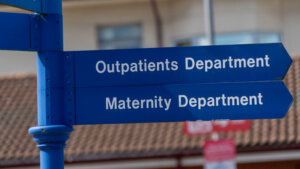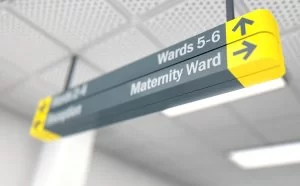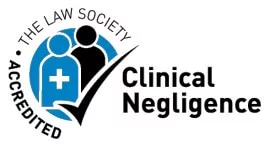Pressure Sore Claims
Pressure Sore Compensation Claims
Pressure sores are a significant issue of concern within our health care system.
“Small but very effective and experienced team so every client benefits from the personal touch but also highly skilled litigation know-how. Capability of the team means they can handle all aspects of very complex cases as well as straightforward matters.”
“Osbornes Law is an established firm which handles a breadth of complex and high-value clinical negligence matters.”
According to NHS England the total cost of the problem is estimated to be between £1.4 billion and £2.1 billion annually. In nursing homes, it is estimated that 1 in 10 residents will suffer from pressure sores at any one time. On average, 2,000 pressure sores are newly acquired each month and up to 200,000 people developed a new pressure sores in 2017/2018.
What is a pressure sore?
Pressure sores, also known as bed sores, are areas of damaged skin. Pressures sores are a type of ulcer which develop in people who are immobile, bed-bound, or unable to feel pain. Elderly frail adults, as well as those with diabetes or problems with their blood circulation are at high risk of developing pressure sores. Patients with poor nutrition, cognitive impairment and who are unable to reposition themselves are also at risk.
The areas most likely to be affected by pressure sores are pressure points which bear the weight of the immobile patient, for example heels, shoulder blades, hips and buttocks.
How do pressure sores form?
Bed sores occur when the blood supply to the affected area is reduced, due to external pressure. According to the UK’s National Pressure Ulcer Advisory Panel, there are 4 main stages of pressure sore:
1. Non-blanchable. Reddening and darkening of the skin over pressure points. This is an early indication that there may be damage to local blood vessels and deeper tissues. The patient may experience itching or burning. This stage may resolve in a few days.
2. Partial thickness. The skin is broken, forming a shallow ulcer. This can be very painful. These ulcers may heal within 6 weeks.
3. Full thickness skin loss. The ulcer extends deeper into the underlying tissue.
4. Full thickness tissue loss. The ulcer extends to muscle or further into the bone. This presents a high risk of infection and surgery may be required to treat it properly. Pressure sores that reach stages 3 and 4 can take months to heal, but there is also a risk that they may never heal at all.
There are two additional categorisations: suspected deep tissue injury and unstageable, with full thickness skin or tissue loss.
What are the complications of pressure sores?
Pressure sores can be highly dangerous and indeed life threatening, as a result of complications. Infection of the skin, muscles and bone are real risks, for if the infection spreads into the blood it will cause sepsis. In wounds that do not respond to treatment over a prolonged period, there is also a risk of the ulcer cells turning cancerous.
Pressure sores can also lead to severe disabilities and even amputation of limbs. Hospital stays are protracted. Most of all, the pain and suffering of the patient can be severe.
How are pressure sores treated?
When a pressure ulcer develops, it should be closed as soon as possible. However, pressure sores can be very hard to treat. Depending on the severity of the ulcer and the patient’s overall health, they can take days to months to heal. Treatment varies but wound care can include debridement of dead tissue, keeping the wound protected and clean, antibiotics and if severe enough, skin grafting.
Prevention is much better than cure.
Florence Nightingale said, ‘If he has a bedsore, it’s generally not the fault of the disease, but of the nursing’. Although pressure sores can develop despite high quality care, they can be an indication of inadequate nursing care and possibly even neglect.
In recognition of the seriousness and prevalence of pressure sores in vulnerable patients, various acts and guidelines have been produced. In 2014, The National Institute for Health and Care Excellence (NICE) published detailed clinical guidelines regarding the prevention and management of pressure sores. In addition, the Care Act (2014) outlines the duties of local authorities in the care and support of adults, including safeguarding against abuse or neglect and making provision for adequate care standards. As related to pressure sores, the Act requires that guidance should be given to staff who are worried that, ‘A pressure ulcer may have arisen as a result of poor practice, neglect, acts of omission or deliberate harm’.
There are other nationwide initiatives to prevent and treat pressure sores, including the 2018 NHS Improvement Stop the Pressure and PROSPER: Promoting safer providing of care for elderly residents.
For all these guidelines and acts to mean anything in practice, staff in hospitals and in the community, including nursing homes must be trained in pressure ulcer prevention.
Prevention techniques can include:
- Daily monitoring of skin in vulnerable patients
- Regular turning and repositioning regimens
- Skin care including the use of specialised dressing
- Adequate nutrition
- Using specially designed cushions and mattresses
Can you claim compensation for bed sores?
Despite the widespread recognition of the risk from pressure sores and the recent healthcare initiatives, people are still developing pressure sores while under the care of nursing homes, district nurses and hospitals.
For a negligence claim to be successful, there must be evidence that there was a duty of care and that duty of care was breached, resulting in harm. In the case of pressure sores, taking legal action may be the best way to ensure that standards of care are improved not only for your loved one, but also for other vulnerable people in the future. If you think you or a loved one has suffered a pressure sore due to medical negligence, get in touch with one of our knowledgeable and experienced solicitors at Osborne’s Law.
Pressure Sore Case Study
Our client (Mr B) was admitted into the hospital following a neurological injury. One of his pressure sores was at the base of his spine and this sore developed and increased in size over several weeks and during this time he suffered pyrexia and despite this, there was no change to his 4 hourly turning regime. His condition deteriorated to such an extent that he was transferred to another hospital, for medical intervention.
Eventually, our client was taken to the theatre for debridement of his pressure sore and part of the bone at the base of his spine had to be removed as a consequence of infection. It was not until months later that he was able to sit in a wheelchair for 35 minutes; this is 4 months after the surgery to his spine. Mr B remained in hospital a further number of months and then he was transferred to a Home where he remains and although he has suffered chest infections he remains in reasonable health.
Stephanie Prior, medical negligence solicitor at Osbornes Law, settled Mr B’s case following on-going negotiations and five figure damages were awarded. Nicholas Leahy secured the court’s approval of the award following a hearing at the Central London County Court.
Pressure Sore Solicitors
- Our medical negligence solicitors will review your potential claim by advising you on claiming against the NHS or other alternative procedure if your case does not relate to NHS care and treatment.
- We will not charge a fee for our time in reviewing your case.
- We can assist you with any issues that you may have regarding the complaints procedure or that you encounter in obtaining copies of your medical records.
- We will advise you of the course of action with respect to your case.
Contact us about a Pressure Sole Claim
Call us 020 7485 8811
Email us Send us an email and we’ll get back to you
Small but very effective and experienced team so every client benefits from the personal touch but also highly skilled litigation know-how. Capability of the team means they can handle all aspects of very complex cases as well as straightforward matters.
Osbornes is a very respected firm in the marketplace.
They handle really complex cases very well
The clinical negligence team are knowledgeable and professional in their approach and demonstrate a high level of skill in litigation work.
Osbornes Law offers experience in obstetric and fatal claims as well as niche cauda equina cases.
Osbornes Law is an established firm which handles a breadth of complex and high-value clinical negligence matters.
Osbornes has a skilled team of solicitors advising clients on a wide range of clinical negligence matters.
Hard working, approachable, good knowledge of clinical negligence and clients’ specific conditions
A joy to work with and always 100% client focused at all times.
The clinical negligence team at Osbornes is much lauded for its ability to ‘represent the diverse range of London-based clients
“The team is very quick and efficient in responding."
"Obsbornes Law is always client-focused and works tirelessly to obtain the best outcomes for clients."
‘They are ambitious for their clients and expect high standards from all who work with them.’
"Osbornes somehow combine the accessibility of a local firm, with the professional standards of a national or city outfit."
"Osbornes, is described as having ‘superb judgement and a medical knowledge that is second to none."
Stephanie has developed a particularly strong reputation for her handling of birth injury claims, as well as cases concerning surgical negligence and delays in surgery.
"An excellent firm which achieves fantastic outcomes for clients."
"Stephanie Prior takes on complex cases and gets excellent results. She has a background in medicine which serves her clients well and is a realistic but tough litigator."
"Stephanie Prior is hugely dedicated, adored by her clients, tenacious, efficient and extremely knowledgeable."
"Stephanie Prior is very good with troubled clients and is easily able to make them feel at ease."
"Stephanie shows sensitivity and deals with things in an understanding way."
Osbornes provides a very intimate and personal client service which is increasingly rare in this sector.
The lawyers in the team are highly experienced and will drive cases very hard on behalf of their clients.
"Stephanie Prior has a realistic attitude to the complexities of the cases. She wins the trust of her clients and goes the extra mile to ensure they get the best outcomes."
"Stephanie Prior... manages a varied caseload, including obstetric claims, child and adult brain injury cases and fatal and non-fatal spinal cord injury cases."
"Stephanie is experienced, knowledgeable of all aspects of clinical negligence work, and strategic in running cases."
"An exceptional outfit. They take on difficult cases, fight hard and win."
"The team were extremely professional in putting my needs first. There was a joined-up approach to catering for the client, and all lawyers involved were briefed and constructive."
Stephanie Prior is always very professional and kind. Highly recommended.
Quite simply excellent, with a highly competent and well-rounded team. They understand complex medical litigation and have been our lifesavers, and we will always owe them our immense gratitude.
News & InsightsVIEW ALL
- 10.7.2025
Osbornes Law Secures £700K in Crohn’s Negligence...
Negligent delay in diagnosing Crohn’s disease leads to £700K settlement Jodi Newton, Partner, was instructed in a case against...
Read more - 13.5.2025
Damages Recovered for Necrotic Pressure Sore
Elline Demetriou recovers damages following a necrotic pressure sore on her client’s heel Elline Demetriou, Solicitor in our clinical...
Read more - 12.5.2025
Complaints Against Suspended Surgeon Ms Kuldeep Stohr
Ms Kuldeep Stohr, orthopaedic surgeon at Addenbrooke’s Hospital suspended In February 2025, Cambridge University Hospitals NHS Foundation Trust (CUH) confirmed...
Read more - 6.5.2025
Six-Figure Settlement for Negligent C-Section Delivery
Osbornes secures a six-figure settlement following a negligent caesarean section delivery Jodi Newton, Partner and head of our Obstetric and...
Read more - 6.5.2025
Six-Figure Settlement for Negligent Shoulder Surgery
Settlement following a claim against Bedfordshire Hospitals NHS Foundation Trust Elline Demetriou, a Solicitor in our clinical negligence team, acted...
Read more - 29.4.2025
Five-Figure Settlement in Fatal Medical Negligence Case
Osbornes Law secures a five-figure compensation following a fatal medical negligence claim Osbornes acted for our client, E, who brought...
Read more - 4.4.2025
Time To Move On From Physician Associates?
BMA raises concerns over patient safety: the risks of Physician and Anaesthesia Associates in the NHS The British Medical Association (...
Read more - 13.3.2025
Addenbrooke’s Hospital Complaints
Review finds harm to children by surgeon at Addenbrooke’s Hospital An independent review by Cambridge University Hospitals NHS Foundation...
Read more - 4.2.2025
Claim Settled for Child’s Surgery Injuries
Osbornes secures settlement for child’s surgery-related injuries Osbornes Law successfully represented a minor, X, in a claim against two...
Read more - 29.1.2025
£27,000 DVT Claim Settled Against Royal Free London NHS
Successful settlement for DVT case against Royal Free London NHS Foundation Trust Successful Settlement of £27,000.00 for DVT Claim against Royal...
Read more - 14.10.2024
Multi-Million Settlement in Cerebral Palsy Negligence Case
Judge awards multi-million settlement in cerebral palsy medical negligence claim Jodi Newton, Partner and specialist medical negligence lawyer at Osbornes...
Read more - 19.9.2024
Report highlights failings in maternity care
The Care Quality Commission (CQC) has recently carried out a national review of 131 maternity inspections between 2022 and 2024, finding that failures...
Read more - 12.9.2024
Great Ormond Street Hospital Negligence & How to Claim
Review of negligence at Great Ormond Street Hospital At Osbornes Law, we’ve supported families through some of the most...
Read more - 29.8.2024
AB v Central London Community Healthcare NHS Trust
Background Our client, AB, had been using the Nexplanon contraceptive device for 6 years. She had a Nexplanon device inserted into...
Read more - 30.7.2024
What Is the Role Of a Physician Associate?
What does the Position of Physician Associate Mean for the NHS? There are many different jobs within the NHS, each...
Read more - 17.7.2024
Settlement for Delay in Wrist Fracture Treatment
Our Clinical Negligence team have recently agreed the settlement of a case relating to a delay in the treatment of...
Read more - 28.6.2024
£55,000 Settlement for Stillbirth Claim Against Chelsea and Westminster...
Successful Settlement for Stillbirth Claim Against Chelsea and Westminster Hospital NHS Foundation Trust Background Nick Leahy, an Associate in our...
Read more - 9.5.2024
Claim Against Royal Free London NHS Foundation Trust...
Client obtains settlement after being victim of a surgical negligence Jodi Newton, Partner in our Clinical Negligence department, recently settled...
Read more - 30.4.2024
Settlement In Neonatal Death Case
Settlement in fatal medical negligence case against King’s College Hospital Nick Leahy, Associate in our Clinical Negligence department, recently...
Read more - 8.4.2024
Epilepsy Negligence Compensation Claim
Nicholas Leahy, an Associate in the Clinical Negligence team at Osbornes Law, has recently settled a long-running fatal medical negligence...
Read more - 11.1.2024
New UK Supreme Court Ruling regarding Secondary Victims...
The Supreme Court has today, on the 11th January 2024, upheld the Court of Appeal’s order to dismiss the claims...
Read more - 11.1.2024
Secondary Victim Claims
Secondary victims in clinical negligence cases What is a secondary victim in clinical negligence cases? Most compensation claims are concerned...
Read more - 5.1.2024
Delayed Pre-Eclampsia Diagnosis Results in Loss of Baby
Introduction to the case Nick Leahy, Associate in our Clinical Negligence department, has recently settled a birth injury claim against...
Read more - 12.12.2023
NHS Compensation Payouts Guide
What Are NHS Compensation Payouts? In the UK, the National Health Service delivers the vast majority of healthcare services. When...
Read more
































